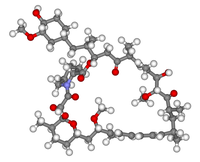
Photo from wikipedia
Simple Summary Lung cancer is the main cause of cancer-related deaths worldwide, mainly due to treatment resistance. For that reason, it is necessary to develop novel therapeutic strategies to overcome… Click to show full abstract
Simple Summary Lung cancer is the main cause of cancer-related deaths worldwide, mainly due to treatment resistance. For that reason, it is necessary to develop novel therapeutic strategies to overcome this phenomenon. The aim of our study was to design and characterize a synthetic anionophore, LAI-1, that would be able to efficiently disrupt lysosomal activity, leading to autophagy blockage, one of the most important resistance mechanisms in cancer cells. We confirmed that LAI-1 selectively localized in lysosomes, deacidifying them. This effect produced a blockage of autophagy, characterized by an abrogation of autophagosomes and lysosomes fusion. Moreover, LAI-1 produced cell death in lung cancer cells from different histological subtypes, inducing cytotoxicity more efficiently than other known autophagy inhibitors. Finally, LAI-1 was evaluated in combination therapy, showing sensitization to the first-line chemotherapeutic agent cisplatin. Altogether, LAI-1 is a novel late-stage autophagy inhibitor with potential therapeutic applications in tumors with cytoprotective autophagy. Abstract Overcoming resistance is one of the most challenging features in current anticancer therapy. Autophagy is a cellular process that confers resistance in some advanced tumors, since it enables cancer cells to adapt to stressful situations, such as anticancer treatments. Hence, the inhibition of this cytoprotective autophagy leads to tumor cells sensitization and death. In this regard, we designed a novel potent anionophore compound that specifically targets lysosomes, called LAI-1 (late-stage autophagy inhibitor-1), and evaluated its role in blocking autophagy and its potential anticancer effects in three lung cancer cell lines from different histological subtypes. Compared to other autophagy inhibitors, such as chloroquine and 3-Methyladenine, the LAI-1 treatment induced more potent anticancer effects in all tested cancer cells. LAI-1 was able to efficiently target and deacidify lysosomes, while acidifying cytoplasmic pH. Consequently, LAI-1 efficiently blocked autophagy, indicated by the increased LC3-II/I ratio and p62/SQSTM1 levels. Moreover, no colocalization was observed between autophagosomes, marked with LC3 or p62/SQSTM1, and lysosomes, stained with LAMP-1, after the LAI-1 treatment, indicating the blockage of autophagolysosome formation. Furthermore, LAI-1 induced cell death by activating apoptosis (enhancing the cleavage of caspase-3 and PARP) or necrosis, depending on the cancer cell line. Finally, LAI-1 sensitized cancer cells to the first-line chemotherapeutic agent cisplatin. Altogether, LAI-1 is a new late-stage autophagy inhibitor that causes lysosomal dysfunction and the blockage of autophagolysosome formation, as well as potently induces cancer cell death and sensitization to conventional treatments at lower concentrations than other known autophagy inhibitors, appearing as a potential new therapeutic approach to overcome cancer resistance.
Journal Title: Cancers
Year Published: 2022
Link to full text (if available)
Share on Social Media: Sign Up to like & get
recommendations!